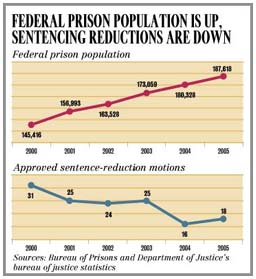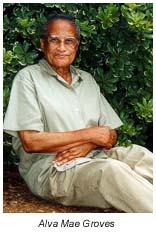 Compassionate Release A
'Dead Letter'? Compassionate Release A
'Dead Letter'?
The
U.S. Department of Justice and the U.S. Sentencing Commission
are at loggerheads over a commission proposal to expand the extraordinary
circumstances that make prisoners eligible for so-called compassionate
release or reduction in sentence.
The commission in early May sent Congress
a proposed sentencing guideline that, for the first time in 24
years, would give courts guidance on what should be considered
extraordinary and compelling grounds for adjusting a sentence.
 The guideline broadens
the grounds beyond current policy at the Federal Bureau of Prisons,
and comes at a time when the Justice Department is in the final
stage of approving a regulation that narrows even further the
current policy. The guideline broadens
the grounds beyond current policy at the Federal Bureau of Prisons,
and comes at a time when the Justice Department is in the final
stage of approving a regulation that narrows even further the
current policy.
The American
Bar Association, Families
Against Mandatory Minimums and other groups had urged the
commission for years to act on a mandate to the commission in
the Sentencing Reform Act of 1984. In that law, Congress mandated
that the commission issue policy statements on how the law's
compassionate-release section should operate and what factors
should be considered extraordinary and compelling.
The Bureau of Prisons has interpreted the
law narrowly, generally only approving motions for cases in which
a prisoner is terminally ill or incapacitated by illness. The
Justice Department warned last summer that any expansion of current
policy would be a "dead letter".
Despite the department's opposition, the
commission defines extraordinary and compelling reasons as: "
terminal illness; a permanent physical or medical condition,
or deteriorating physical or mental health because of the aging
process, that "substantially diminishes" the prisoner's
ability to provide self-care; the death or incapacitation of
the prisoner's only family member capable of caring for the prisoner's
minor child or minor children; or, as determined by the Bureau
of Prisons, there is an extraordinary and compelling reason other
than, or in combination with, the reasons described".
Since 1990, the Bureau of Prisons has filed
an average of only 22 sentence-reduction motions each year despite
a steadily increasing federal prison population. -- Source:
National Law Journal
 Alva Mae Groves Alva Mae Groves
Sentenced To 25 Years At Age 72
I
am now 86 years old and have been incarcerated since 1994.Although
I was charged with Drug Conspiracy, my real crime, according
to today's laws of betrayal, was refusing to testify against
my own children to receive a sentence reduction.
Of course I didn't really understand all
the talk about enhancements, acceptance of responsibility, and
so on, that had to do with my sentencing. But I did understand
that since I wouldn't turn against my own family, I was going
to receive a very lengthy prison term. Never did I dream it would
be twenty-five years.
When I was arrested I had $1,000.00 in
the bank from selling eggs and candy. Most of it was deposited
in change - nickels, dimes and quarters - and the bankers substantiated
this fact. I earned that money one egg at a time, one soda pop
at a time, one candy bar at a time. It wasn't from selling drugs
as the government contends.
I realize everyone has a day to die; death
is a fate that will not be cheated. But I don't want to die in
prison. I want to die at home surrounded by the love of what's
left of my family. I do not have enough years left of my life
to finish serving this 25 year sentence. I'm appealing to anyone
to write letters for me to the Pardon Attorney's Office in Washington
while my application is still pending. -- Read
more of Alva Mae's story here.
 Vicki Rosepiler Vicki Rosepiler
Cancer Victim Serving 24 Years
I
received the longest sentence (292 months) of anyone in my case.
Although I pled guilty, I didn't have any key information to
trade for sentence reductions. In response to my 2255 motion,
the magistrate stated, "the first to squeal gets the deal."
In 2000, I was diagnosed with cancer. I
was not able to receive treatment for 6 months, so the cancer
spread to other areas and I was eventually flown to the federal
medical facility in Carswell, TX to endure chemo, radiation and
radium seeks implants (brachytherapy.) I endured all this while
chained to a bed, alone and frightened. No one can imagine what
this does to a person. I now value every moment and I'm thankful
to be alive every day.
I have many long-term side-effects due
to extensive nuclear medicine that my body endured. The odds
are not in my favor that the cancer will remain in remission.
There is always a high risk that it will return elsewhere. I
don't want to die in prison and have worked extremely hard to
better myself.
In the event I receive clemency I have
a wonderful support group waiting to help me rebuild my life.
I will live with my mother and father who fortunately are still
healthy and have stood by me throughout this horrible nightmare.
(For more info, see www.candoclemency.com) -- Read
more of Vicki's story here.
|




